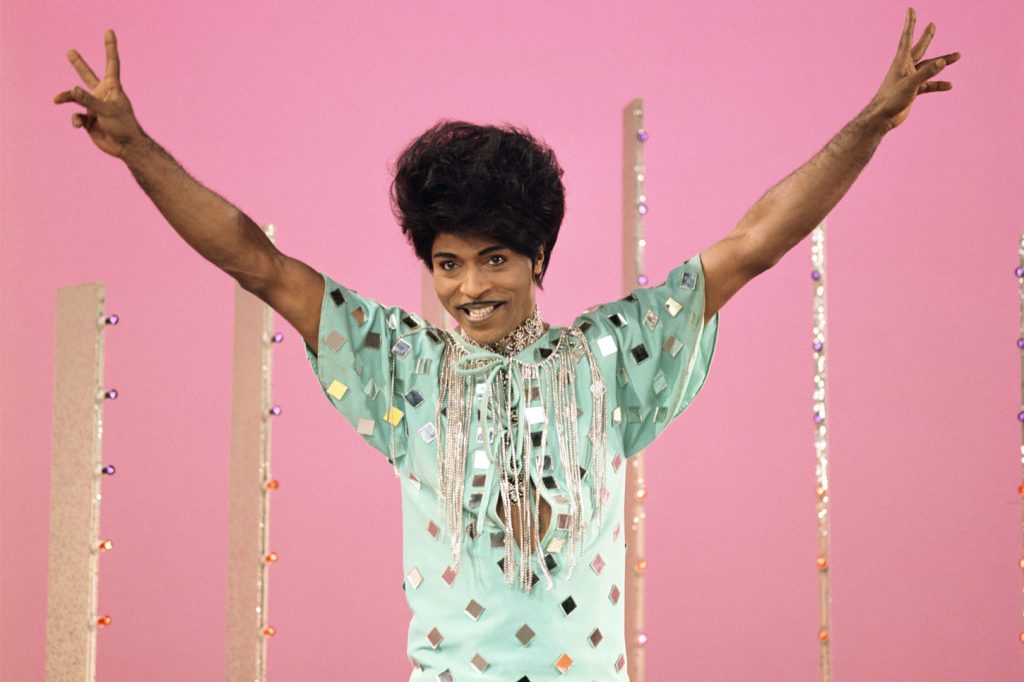Often an overlooked figure in the world of Rock n’ Roll, filmmaker Lisa Cortés pays tribute to the legendary Little Richard, putting the microscope on the conflicted musical pioneer. Little Richard: I Am Everything shines a light on Richard’s conflicting battle between sexuality and faith, his seminal musical output, and his battle for recognition. Taking a talking-head meets archive-footage approach Cortés fills her feature with a variety of moments of stylistic flair, whilst giving an impressive insight into the musician’s psyche in an engaging, accessible manner.
Cortés traces Richard’s story back to 1930s Macon, Georgia exploring a young man’s discovery of music – delving into the journey of the young boy with a passion for church singing who would eventually grow into the flamboyant character who would defiantly declare “I am the Bronze Liberace,” followed by a trademark “Shut up!” Taking her focus back to 1930s Georgia allows Cortés to explore the links between queerness and the South, delving into the Southern Gothic connotations of the period. I Am Everything captures the eccentric spirit of Richard and his place in the pantheon of Southern queerness delving into his mentorship by gospel singer Sister Rosetta and later exploration into his drag persona Princess LeVonne. Richard’s story is depicted in countless talking head contributions from former bandmembers and industry names, with Mick Jagger, Tom Jones, John Waters, Billy Porter, and Nona Hendryx all contributing.
Richard’s rise to fame and the shaping of his on-stage persona inspired by artists such as Billy Wright and Esquerita soon makes way into the formation of his musical back-catalogue including the recording of his seminal hit Tutti Frutti and the runaway success of later singles such as The Girl Can’t Help It. Richard’s musical catalogue is captured in well-pitched performances of his hits from stars including Valerie June and Cory Henry.
Richard’s conflicting relationship with his own sexuality forms much of the core of Cortés’s documentary, with the performer delving into and out of the closet through his lengthy career. In some forms, joyously celebrating his queerness and flamboyance, yet in other phases of his life renouncing this as sinful. Richard’s visions of a plane crash and subsequent apocalypse prompted a spiral into religious study in Oakland and short-lived marriage to Ernestine Campbell from 1959 to 1963. Yet I Am Everything suggests an innate failure in suppressing his true sexuality, with Richard returning to showmanship, flamboyance and embracing of his queer sexuality after comeback shows in London. His descent into the world of drugs and the subsequent death of his brother, would prompt a further bounce back into the church with Cortés capturing this and attempting to give insight into the star’s conflicted psyche.
Just as Little Richard: I Am Everything holds the microscope over Richard’s confusing relationship with his own sexuality, Cortés explores the singer’s rise to fame in a racially divided society. The performer’s blackness leading to his music being hijacked through weaker cover versions from Pat Boone and Elvis Presley shows the inherent racism of the industry, whilst some hope is seen in the rise of the teenage music scene and young people’s desire to integrate at Richard’s concerts. The documentary makes some interesting observations about the concept of a teenager forming, music as a unifying force, and fractured America against the backdrop of the Emmett Till story, with Richard’s career as the vehicle which this political context is explored.
Cortés attaches a real visual panache to Little Richard: I Am Everything, capturing Richard as part of the fabric of pop culture through the use of cosmic space-themed visuals. The latter act of the documentary centres on Richard’s final sense of industry acceptance, through to his honouring by the American Music Awards – tracing his impact in a montage exploring his mark on legions of successive pop stars.
Little Richard: I Am Everything is a captivating insight into the complex contradictions which lurked within Little Richard. Insightful and expansive in its exploration of the performer, his career and public persona, Cortés has crafted an incredibly satisfying tribute to Little Richard.
You may also like
Chanteuse Extraordinaire Arielle Dombasle Delivers Sparkling Cover of ‘Diamonds Are Forever’ Ahead of ‘Iconics’ Project
Baccara Deliver Magnetic New Eurodisco Anthem ‘Vamos Al Cielo’
Pop Legend Haddaway Delivers a High Energy 80s Inspired Banger On ‘Lift Your Head Up’
Elevator Boys Deliver Poignant Vocals On Powerful New Single ‘Parachute’
Denmark’s Christopher Drops Powerhouse New Single ‘One’, Announces New European Tour Dates
